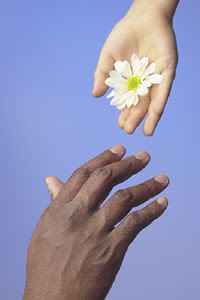
Do you often give thought about the importance of the colours in our life? I suggest that it is quite importat for everyone of us. But do you frequently use the colours deliberately? I am asking this questions becouse there is the psychology of colous, each colour imagines different feelings and emotions.
For example green is the most relaxing and less tiring colour, so it is very suitable for painting the walls of the bedrooms and other areas, where you would like to come loose.
The simbol of peace is white dove, because white is pure strong colour, doctors usually wear white smocks instil trust. Black is opposite of white. It is the colour of power, authority. Frequently gangsters, vampires wear black. Brown is the opposite of black too. It is the colour of warm, friendly, sometimes weak people. But if a person wears grey it means that he or she do not want to be noticed at all. So it is better to stay away from him or her that day. Yellow colour fits best when you are going to meet new people, because it is a colour of openness and freedom. Red colour is very excitening and stimulating colour. 80% flags contain red colour. It is successful colour and is usually used by footbal teams. Blue is reverse red. It is very calm and peaceful colour. this colour is on the flag of the United Nations.
So my recommendation is to keep in mind that colours have a particular meaning.
For example green is the most relaxing and less tiring colour, so it is very suitable for painting the walls of the bedrooms and other areas, where you would like to come loose.
The simbol of peace is white dove, because white is pure strong colour, doctors usually wear white smocks instil trust. Black is opposite of white. It is the colour of power, authority. Frequently gangsters, vampires wear black. Brown is the opposite of black too. It is the colour of warm, friendly, sometimes weak people. But if a person wears grey it means that he or she do not want to be noticed at all. So it is better to stay away from him or her that day. Yellow colour fits best when you are going to meet new people, because it is a colour of openness and freedom. Red colour is very excitening and stimulating colour. 80% flags contain red colour. It is successful colour and is usually used by footbal teams. Blue is reverse red. It is very calm and peaceful colour. this colour is on the flag of the United Nations.
So my recommendation is to keep in mind that colours have a particular meaning.
